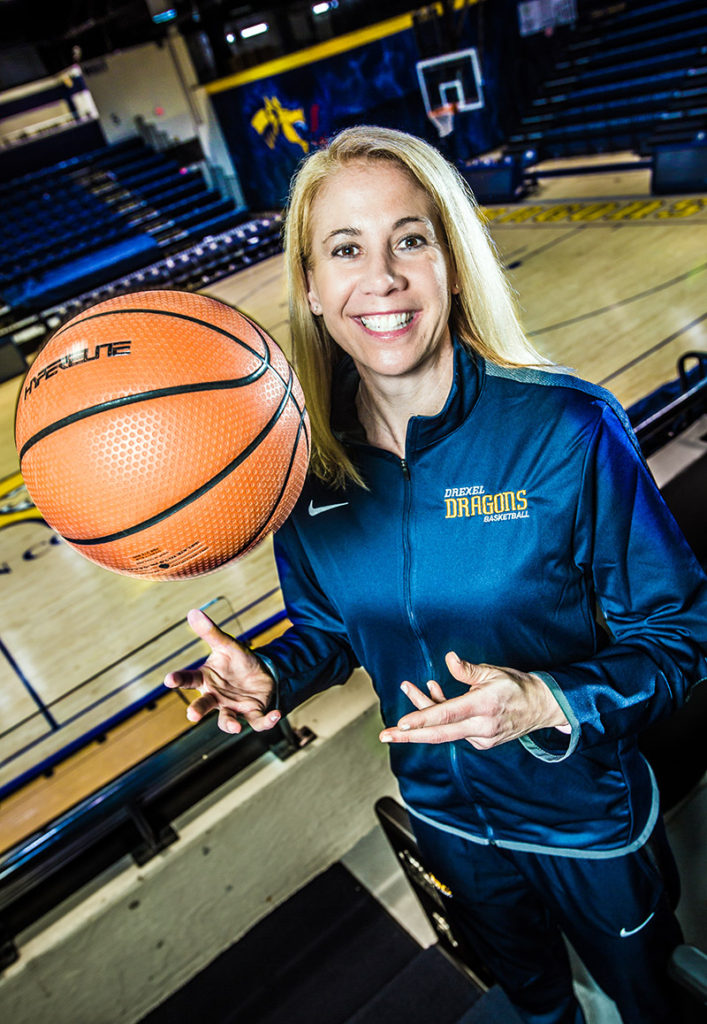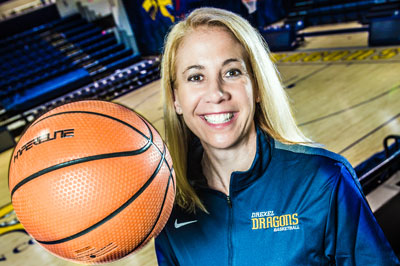
Denise Dillon wasn’t here for the Drexel women’s basketball team’s down years, when the Dragons posted losing seasons from 1991 to 1999, but she remembers them nonetheless. She was watching the Dragons scuffle from her vantage on the Main Line, where she went from four-year standout on the hardwood at Villanova University right into an assistant coaching position. Even then, during the worst run in the Dragons’ Division I history, she knew there was a brighter future possible at Drexel.
“I knew what Drexel was while I was a player, and it was a program that was struggling a little bit,” Dillon says. “I always had the mentality that this school could be something. They could have a winning basketball program. The first step was to get my foot in the door.”
Fifteen years on, few could disagree with Dillon’s vision. Since she took over as the Dragons’ head coach in 2003, the program has posted 12 winning seasons, a winning percentage pushing .600, a Colonial Athletic Association championship in 2009 and a Women’s National Invitation Tournament championship in 2013. On New Year’s Eve she pulled down her 265th career victory, making her the winningest coach in Drexel history, and this spring after the team won the regular season CAA championship she was named CAA Coach of the Year for the third time. But don’t assume that she’s ready to take any of the credit for all that success.
“It’s all about the players who have come before this group we have, and the present players, and my coaching staff who I’ve been extremely fortunate to have had by my side since the start,” Dillon says. “The reality is that all of us are involved with that number.”
Turning the Dragons from perennial punching bags into an annual contender was a tall task for Dillon, but she knew she had fertile ground to draw from in fielding her team. The Philadelphia region, she says, is home to the best basketball in the country, in large part because of the six Division I schools that share the community. By drawing in local talent like Catherine Scanlon ’06 (a forward from Drexel Hill whose name peppers the Dragons’ record books) and finding a niche with international recruits like Romanian forward Gabriela Marginean ’10, Drexel’s all-time leading scorer and the leader of the 2009 title team, Dillon built a winning program from the ground up.
The pitch to recruits was simple, she says: “You’re going to start the winning ways here at Drexel.”
She was right.
Along the way, those recruits became student-athletes and helped deliver a slew of memorable moments for Dillon. Her upstart squad beat Old Dominion University at home in the middle of last decade when the Lady Monarchs were a dominant force in the CAA, and just a few years later repeated the performance to end the team’s 17-year run atop the conference. There was the double-overtime road win in 2010 over the University of Delaware and future WNBA star Elena Delle Donne, and the WNIT championship win over the University of Utah that sent the crowd at the DAC into a court-storming frenzy.
As much as the wins, she prides herself on what’s happened beyond the box scores — the academic successes, the women her players have grown into, the coaching staff filled with former Dragons who wanted to remain a part of the program.
“Denise is the perfect fit for an athletics program such as ours that celebrates success on and off the court,” says Athletic Director Eric Zillmer, one of the people Dillon credits with giving her a chance, along with Deputy Athletic Director Nick Gannon and former Senior Vice President Anthony Caneris. “She is a class act, and I’ve learned so much from her.”
Dillon studied education at Villanova and always knew she’d like to coach at some level, whether that meant youth or high school basketball. She spent time helping out with local AAU teams and worked at basketball camps in college, but it took a season-ending shoulder injury in her junior season with the Wildcats to set her sights on collegiate coaching.
From the bench, the game made a different kind of sense.
“I could hear my coach and what he was saying, and also why he was saying it,” Dillon says. “I remember being at a game and thinking, ‘This is what I want to do.’” Luckily for Drexel, it stuck.



